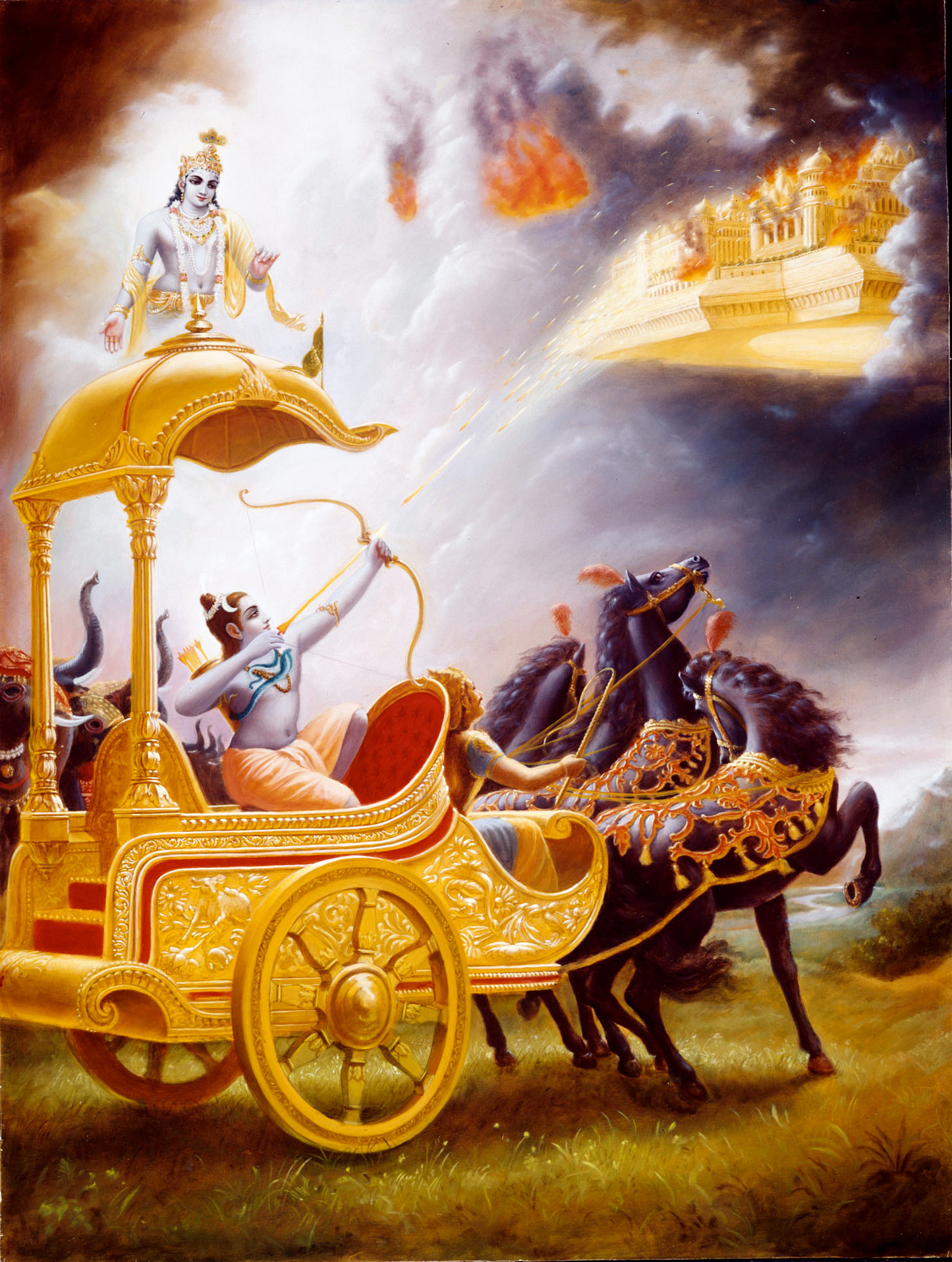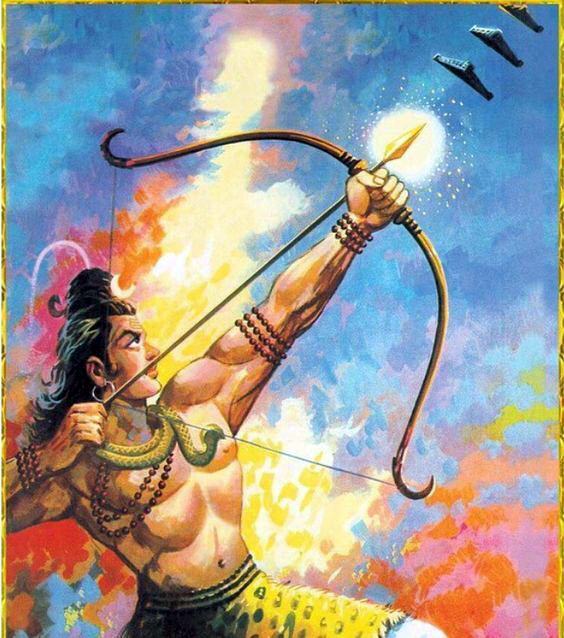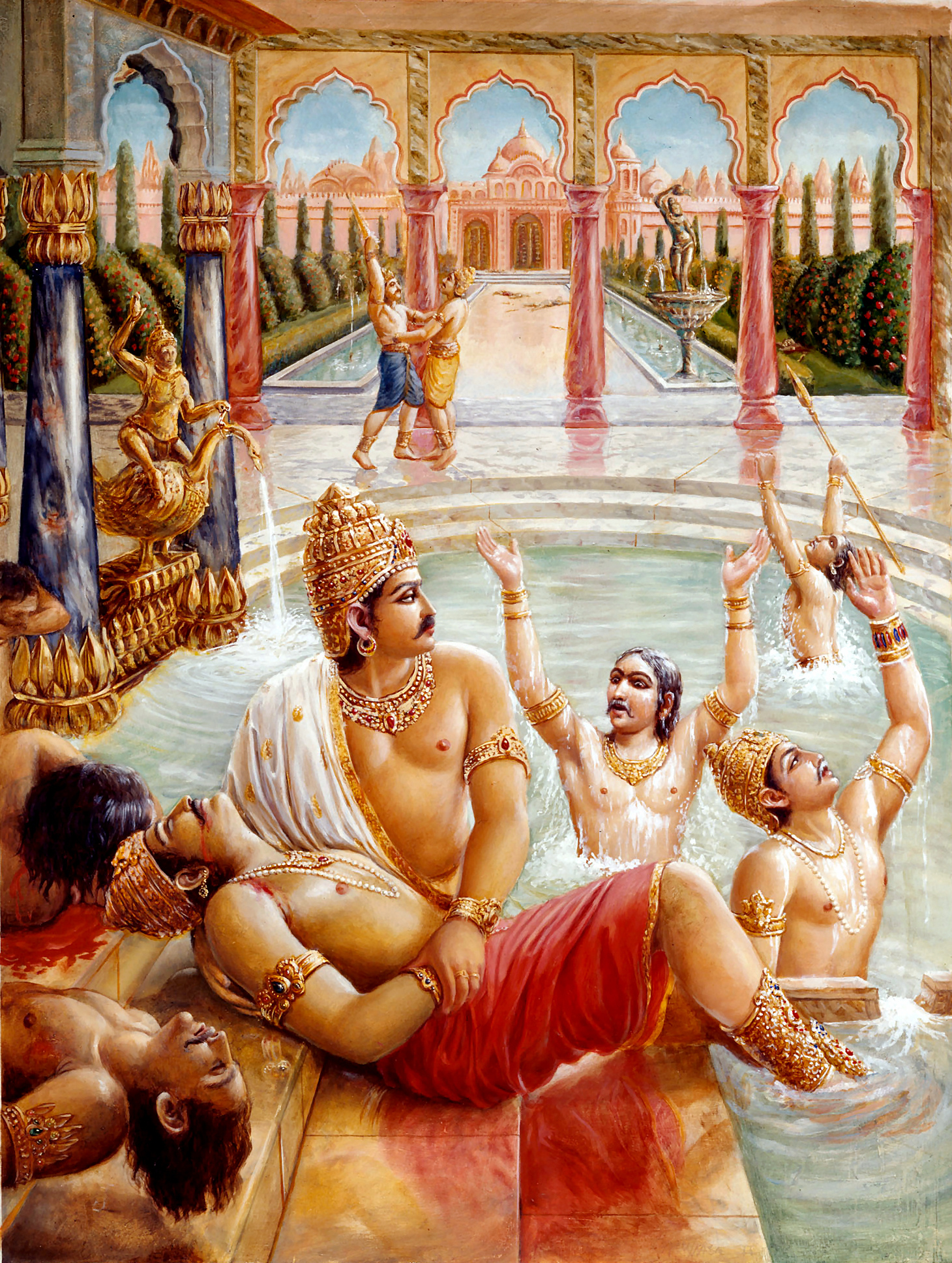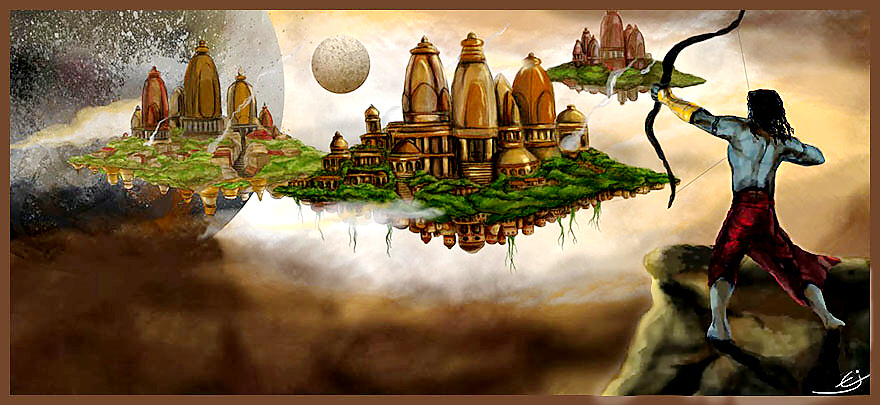Thus Lord Siva is known as Tripurāri, the annihilator of Tripura, or the
three cities of the demons , because he burnt these dwellings to ashes.
Nārada Muni described how the demon Maya Dānava constructed Tripura (three cities) for the demons, who became very powerful and defeated the demigods. Because of this defeat, Lord Rudra, Śiva, dismantled Tripura; Siva destroys the triple demon city of Tripura with a single arrow. (SB/7/10/51-70)
Why Lord Śiva is known as Tripurāri
My dear King Yudhiṣṭhira, long, long ago in history, a demon known as Maya Dānava, who was very expert in technical knowledge, reduced the reputation of Lord Śiva. In that situation, Kṛṣṇa, the Supreme Personality of Godhead, saved Lord Śiva.
Mahārāja Yudhiṣṭhira said: For what reason did the demon Maya Dānava vanquish Lord Śiva’s reputation? How did Lord Kṛṣṇa save Lord Śiva and expand his reputation again? Kindly describe these incidents.
Nārada Muni said: When the demigods, who are always powerful by the mercy of Lord Kṛṣṇa, fought with the asuras, the asuras were defeated, and therefore they took shelter of Maya Dānava, the greatest of the demons.
Maya Dānava, the great leader of the demons, prepared three invisible residences and gave them to the demons. These dwellings resembled airplanes made of gold, silver and iron, and they contained uncommon paraphernalia. My dear King Yudhiṣṭhira, because of these three dwellings the commanders of the demons remained invisible to the demigods. Taking advantage of this opportunity, the demons, remembering their former enmity, began to vanquish the three worlds—the upper, middle and lower planetary systems.
Thereafter, when the demons had begun to destroy the higher planetary systems, the rulers of those planets went to Lord Śiva, fully surrendered unto him and said: Dear Lord, we demigods living in the three worlds are about to be vanquished. We are your followers. Kindly save us.
The most powerful and able Lord Śiva reassured them and said, “Do not be afraid.” He then fixed his arrows to his bow and released them toward the three residences occupied by the demons. The arrows released by Lord Śiva appeared like fiery beams emanating from the sun globe and covered the three residential airplanes, which could then no longer be seen.
Attacked by Lord Śiva’s golden arrows, all the demoniac inhabitants of those three dwellings lost their lives and fell down. Then the great mystic Maya Dānava dropped the demons into a nectarean well that he had created.
PURPORT: The asuras are generally extremely powerful because of their mystic yogic power. However, as Lord Kṛṣṇa says in Bhagavad-gītā (6.47):
“Of all yogīs, he who always abides in Me with great faith, worshiping Me in transcendental loving service, is most intimately united with Me in yoga and is the highest of all.”
The actual purpose of mystic yoga is to concentrate one’s attention fully on the Personality of Godhead, Kṛṣṇa, and always think of Him (mad-gatenāntarātmanā). To attain such perfection, one must undergo a certain process—haṭha-yoga—and through this yoga system the practitioner achieves some uncommon mystic power. The asuras, however, instead of becoming devotees of Kṛṣṇa, utilize this mystic power for their personal sense gratification. Maya Dānava, for example, is mentioned here as mahā-yogī, a great mystic, but his business was to help the asuras. Nowadays we are actually seeing that there are some yogīs who cater to the senses of materialists, and there are imposters who advertise themselves as God. Maya Dānava was such a person, a god among the demons, and he could perform some wonderful feats, one of which is described here: he made a well filled with nectar and dipped the asuras into that nectarean well. This nectar was known as mṛta-sanjīvayitari, for it could bring a dead body to life. Mṛta-sanjīvayitari is also an Āyur-vedic preparation. It is a kind of liquor that invigorates even a person on the verge of death.
When the dead bodies of the demons came in touch with the nectar, their bodies became invincible to thunderbolts. Endowed with great strength, they got up like lightning penetrating clouds.
Seeing Lord Śiva very much aggrieved and disappointed, the Supreme Personality of Godhead, Lord Viṣṇu, considered how to stop this nuisance created by Maya Dānava.
Then Lord Brahmā became a calf and Lord Viṣṇu a cow, and at noon they entered the residences and drank all the nectar in the well.
The demons could see the calf and cow, but because of the illusion created by the energy of the Supreme Personality of Godhead, the demons could not forbid them. The great mystic Maya Dānava became aware that the calf and cow were drinking the nectar, and he could understand this to be the unseen power of providence. Thus he spoke to the demons, who were grievously lamenting.
Maya Dānava said: What has been destined by the Supreme Lord for oneself, for others, or for both oneself and others cannot be undone anywhere or by anyone, whether one be a demigod, a demon, a human being or anyone else.
PURPORT: The Supreme Lord is one—Kṛṣṇa, the viṣṇu-tattva. Kṛṣṇa expands Himself into viṣṇu-tattva personal expansions (svāṁśa), who control everything. Maya Dānava said, “However I plan, you plan or both of us plan, the Lord has planned what is to happen. No one’s plan will be successful without His sanction.” We may make our own various plans, but unless they are sanctioned by the Supreme Personality of Godhead, Viṣṇu, they will never be successful. Hundreds and millions of plans are made by all kinds of living entities, but without the sanction of the Supreme Lord they are futile.
Nārada Muni continued: Thereafter, Lord Kṛṣṇa, by His own personal potency, consisting of religion, knowledge, renunciation, opulence, austerity, education and activities, equipped Lord Śiva with all the necessary paraphernalia, such as a chariot, a charioteer, a flag, horses, elephants, a bow, a shield and arrows. When Lord Śiva was fully equipped in this way, he sat down on the chariot with his arrows and bow to fight with the demons.
My dear King Yudhiṣṭhira, the most powerful Lord Śiva joined the arrows to his bow, and at noon he set fire to all three residences of the demons and thus destroyed them.
Seated in their airplanes in the sky, the inhabitants of the higher planetary systems beat many kettledrums. The demigods, saints, Pitās, Siddhas and various great personalities showered flowers on the head of Lord Śiva, wishing him all victory, and the Apsarās began to chant and dance with great pleasure.
O King Yudhiṣṭhira, thus Lord Śiva is known as Tripurāri, the annihilator of the three dwellings of the demons, because he burnt these dwellings to ashes. Being worshiped by the demigods, headed by Lord Brahmā, Lord Śiva returned to his own abode.
PURPORT: As stated in Śrīmad-Bhāgavatam (12.13.16): vaiṣṇavānāṁ yathā śambhuḥ: Lord Śiva is the best of the Vaiṣṇavas, the devotees of Lord Kṛṣṇa. Indeed, he is one of the mahājanas, the twelve authorities on Vaiṣṇava philosophy (svayambhūr nāradaḥ śambhuḥ kumāraḥ kapilo manuḥ, etc. [SB 6.3.20]). Lord Kṛṣṇa is always prepared to help all the mahājanas and devotees in every respect (kaunteya pratijānīhi na me bhaktaḥ praṇaśyati). Although Lord Śiva is very powerful, he lost a battle to the asuras, and therefore he was morose and disappointed. However, because he is one of the chief devotees of the Lord, the Lord personally equipped him with all the paraphernalia for war. The devotee, therefore, must serve the Lord sincerely, and Kṛṣṇa is always in the background to protect him and, if need be, to equip him fully to fight with his enemy. For devotees there is no scarcity of knowledge or material requisites for spreading the Kṛṣṇa consciousness movement.











Speak Your Mind